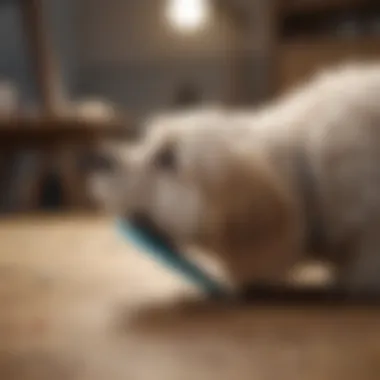Expert Strategies for Flea Elimination in Puppies: A Comprehensive Guide


Pet Care Essentials
Taking care of your puppy goes far beyond just regular walks and playtime. Ensuring your furry friend is free from fleas is crucial for their health and comfort. Let's delve into the essential steps to eliminate these pesky parasites from your puppy's life.
Understanding Flea Infestations and Prevention
Before delving into treatment options, it's vital to grasp how fleas infest and thrive on your puppy's coat. Preventive measures such as regular grooming and creating a clean living environment can significantly reduce the risk of infestations. Understanding the lifecycle of fleas helps tailor your approach to eliminating them effectively.
Regular Grooming and Cleaning Routines
Maintaining a strict grooming schedule for your puppy involves regular baths with flea-repellent shampoo, combing their fur to detect fleas early, and washing their bedding and living areas frequently. Simple habits like vacuuming carpets and upholstery can also remove flea eggs and larvae, preventing further infestations.
Effective Treatment Options
When it comes to treating a flea-infested puppy, there are various options available, from topical treatments to oral medications. Consult your veterinarian to determine the most suitable treatment based on the severity of the infestation. Consistency in treatment is key to eradicating fleas completely.
Environmental Control Measures
Apart from treating your puppy, it's essential to address the underlying cause of the infestation by treating your home and surroundings. Using pet-safe flea sprays, vacuuming frequently, and maintaining a clutter-free environment are crucial steps in preventing reinfestation.
In summary, eliminating fleas from your puppy requires a multi-faceted approach that combines preventive measures, regular grooming, effective treatment, and environmental controls. By following these comprehensive steps, you can ensure your puppy remains happy, healthy, and free from those resilient pests.
Understanding Fleas on Puppies


In this insightful section, we delve deep into the crucial topic of Understanding Fleas on Puppies. It's imperative for pet owners to grasp the nuances of flea infestations to safeguard their beloved companions effectively. By understanding how fleas affect puppies, owners can take proactive measures to prevent infestations and ensure the well-being of their pets. Not only does grasping the intricacies of fleas on puppies aid in effective management, but it also fosters a stronger bond between owners and their furry friends.
Introduction to Fleas and Puppies
Exploring the realm of Fleas and Puppies unveils a realm of parasites that can jeopardize the health and comfort of our four-legged companions. Fleas, small wingless insects, are notorious for their rapid reproduction and blood-feeding habits. When these pests latch onto puppies, they not only cause discomfort through itching and inflammation but also pose potential health risks. Understanding the life cycle of fleas and their interaction with puppies is fundamental in implementing comprehensive flea control measures.
Signs of Flea Infestation in Puppies
Recognizing the Signs of Flea Infestation in Puppies is pivotal in preventing widespread infestations and mitigating potential health hazards. Common indicators of fleas on puppies include incessant scratching, red and irritated skin, hair loss, and the presence of flea dirt. By being vigilant and spotting these signs early on, pet owners can take timely action to address flea infestations before they escalate. Regular inspections and grooming routines play a crucial role in detecting and combatting fleas effectively.
Health Risks Posed by Fleas on Puppies
Unveiling the Health Risks Posed by Fleas on Puppies sheds light on the detrimental effects these parasites can have on our furry companions. Beyond causing skin irritation and allergic reactions, fleas can transmit harmful diseases such as tapeworms and Bartonella. Puppies, with their developing immune systems, are particularly vulnerable to the health risks posed by fleas. Hence, proactive flea control measures are paramount in ensuring the vitality and longevity of our beloved pets.
Preventive Measures for Flea Control
In the realm of pet care, safeguarding your puppy against fleas is paramount to their health and well-being. Preventive measures play a crucial role in averting infestations and ensuring your furry companion leads a comfortable life. Understanding the significance of preventive measures is key to implementing effective strategies for flea control. By focusing on prevention, pet owners can proactively address potential flea issues before they escalate, mitigating the need for more aggressive treatments down the line. Embracing a proactive approach not only benefits your puppy but also spares them from discomfort and potential health risks associated with flea infestations. Prioritizing preventive measures sets the foundation for a secure and flea-free environment, which is essential for every pet owner who cherishes their puppy's welfare.
Maintaining Cleanliness in Puppy Environment
When it comes to combating fleas, cleanliness is your most potent weapon. A pristine living environment is hostile to fleas, impeding their ability to thrive and reproduce. Regularly cleaning your puppy's living space, including bedding, carpets, and toys, is vital in preventing flea infestations. Vacuuming floors and carpets, washing pet bedding in hot water, and frequently cleaning areas where your puppy spends time are effective strategies for eliminating flea eggs and larvae. By upkeeping a strict cleaning regimen, you create an inhospitable habitat for fleas, reducing the likelihood of an infestation. Additionally, regular cleaning not only targets existing fleas but also disrupts their life cycle, breaking the reproductive chain and curbing infestation risks significantly.
Regular Grooming Practices for Flea Prevention
Grooming is not just a cosmetic practice but also a crucial aspect of flea prevention in puppies. Regular grooming sessions provide an opportunity to inspect your puppy's coat for signs of fleas or flea dirt. Brushing your puppy's fur helps in detecting any unwelcome visitors and ensures early intervention if fleas are spotted. Moreover, grooming allows for the distribution of natural oils throughout your puppy's coat, promoting skin health and making it harder for fleas to establish themselves. Incorporating flea combs into your grooming routine can help capture fleas and remove them before they pose a threat. By adhering to consistent grooming practices, you not only bond with your puppy but also actively safeguard their well-being against flea infestations.


Using Flea Preventive Products Suitable for Puppies
Selecting the right flea preventive products tailored to puppies is essential in your flea control arsenal. Consult with your veterinarian to determine the most suitable and safe flea prevention products for your puppy's age and health status. From spot-on treatments to flea collars designed specifically for puppies, the market offers various options to address flea prevention effectively. Opting for products that are formulated for puppies ensures their safety and efficacy in combating fleas without causing harm. Prioritize products that target different stages of the flea life cycle, such as eggs, larvae, and adult fleas, for comprehensive protection. Incorporating vet-approved flea preventive products into your puppy's routine enhances their resilience against flea infestations, safeguarding their health and vitality.
Effective Treatment Options for Fleas on Puppies
Effective treatment options for fleas on puppies play a crucial role in maintaining the health and well-being of your beloved pet. These options encompass a range of methods that target fleas effectively, ensuring your puppy remains comfortable and free from these pesky parasites. By understanding the specific elements and benefits associated with each treatment option, you can make informed decisions tailored to your puppy's needs.
Consulting a Veterinarian for Treatment Guidance
When it comes to addressing flea infestations in puppies, consulting a veterinarian for treatment guidance is paramount. Veterinarians possess the expertise and knowledge required to assess the severity of the infestation and recommend appropriate treatment options. By seeking their guidance, you can receive personalized advice on the most effective ways to eradicate fleas from your puppy while ensuring their overall health and safety are prioritized.
Topical Flea Treatments for Puppies
Topical flea treatments for puppies offer a convenient and effective solution for combating fleas. These treatments typically come in the form of spot-on applications that are applied directly to your puppy's skin. By targeting adult fleas and interrupting their life cycle, topical treatments help break the infestation cycle and provide long-lasting relief for your pet. It is essential to follow the instructions provided by your veterinarian or the product manufacturer to ensure optimal effectiveness and safety.
Oral Medications for Flea Control in Puppies
Oral medications are another viable option for controlling fleas in puppies. These medications come in various forms, including chewable tablets and liquids, making them easy to administer to your pet. Oral medications work by targeting fleas systemically, reaching areas that topical treatments may not cover. By following your veterinarian's dosage instructions and scheduling regular treatments, you can effectively manage and prevent flea infestations in your puppy.
Environmental Flea Control Measures for Puppy Safety
In addition to treating your puppy, it is essential to address the flea infestation in your home environment to ensure long-term efficacy. Environmental flea control measures focus on eliminating fleas from your living spaces and outdoor areas where your puppy spends time. This may involve vacuuming frequently, washing your puppy's bedding, and using pet-safe flea sprays. By combining these efforts with treatments for your puppy, you can create a comprehensive flea control strategy that safeguards your pet's well-being.


Natural Remedies for Flea Removal on Puppies
This section delves into the vital aspect of natural remedies for eliminating fleas on puppies in the broader context of flea control. Why focus on natural remedies, you might ask? Well, natural remedies offer pet owners a gentler, non-toxic alternative to harsh chemicals commonly found in traditional flea treatments. Not only are natural remedies safer for your puppy, but they also pose minimal risks of adverse reactions or side effects. By exploring the realm of natural remedies for flea removal, pet owners can opt for a more holistic approach to combating these pesky parasites.
Herbal Flea Repellents for Puppies
When it comes to herbal flea repellents, the idea revolves around harnessing the power of nature to repel fleas effectively. Herbal flea repellents often contain ingredients like neem oil, citronella, or lavender, known for their natural flea-repelling properties. Such repellents not only deter fleas but also emit pleasant scents, making them a win-win for both pet owners and their furry friends. By incorporating herbal flea repellents into your flea control regimen, you can take proactive steps towards protecting your puppy from flea infestations without exposing them to harmful chemicals.
Essential Oils for Flea Prevention in Puppies
Essential oils have gained popularity for their various applications, including flea prevention in puppies. Oils such as eucalyptus, peppermint, or cedarwood are known for their natural flea-repelling qualities. These essential oils can be diluted and applied to your puppy's bedding or collar to create a protective barrier against fleas. However, it's crucial to exercise caution and ensure proper dilution to prevent skin irritations. By incorporating essential oils into your flea prevention routine, you can enhance your puppy's well-being while keeping those persistent fleas at bay.
Home Remedies for Soothing Flea Bites on Puppies
Flea bites can cause discomfort and irritation to puppies, necessitating the use of home remedies for soothing relief. Home remedies like oatmeal baths, apple cider vinegar rinses, or chamomile tea compresses can help alleviate itching and soothe inflamed skin caused by flea bites. These simple yet effective remedies offer pet owners a natural and cost-effective way to provide relief to their furry companions. By having these home remedies handy, you can address the aftermath of flea infestations on your puppy's skin, promoting healing and comfort.
Additional Tips for Flea Eradication in Puppies
Flea eradication in puppies requires a holistic approach to ensure their well-being and comfort. The Additional Tips section serves as a crucial aspect of this comprehensive guide, offering supplementary strategies to combat fleas effectively. By incorporating these additive tips into your flea control routine, you can enhance the overall efficacy of your efforts. These tips cater to the specific needs of puppies and address nuances that may be overlooked in primary flea control methods.
Regular Flea Checks and Monitoring
Regularly examining your puppy for flea infestations is paramount in maintaining their health and preventing potential issues. Conduct thorough inspections of your puppy's fur, especially in warm and moist areas where fleas tend to proliferate. Look out for signs such as excessive scratching, redness, or visible fleas. Early detection through regular flea checks enables prompt intervention, minimizing the impact of infestations. Establishing a routine for flea monitoring ensures proactive management and swift response to any emerging concerns.
Washing Puppy Bedding and Accessories
Ensuring cleanliness in your puppy's environment plays a significant role in flea control. Washing your puppy's bedding and accessories regularly helps eliminate flea eggs, larvae, and adult fleas that may be present. Use pet-safe detergent and hot water to effectively kill fleas at all life stages. Additionally, vacuuming the surrounding area and disposing of the vacuum bag properly can further reduce the flea population. Clean bedding and accessories create an inhospitable environment for fleas, contributing to comprehensive flea eradication in puppies.
Consultation with Professional Groomers for Flea Control
Seeking assistance from professional groomers with expertise in flea control can provide valuable insights and specialized treatments for your puppy. Professional groomers are trained to identify flea infestations, recommend appropriate grooming techniques, and administer targeted flea control products. Their professional guidance can complement your home-based flea eradication efforts, ensuring a multi-faceted approach to tackling fleas effectively. Collaborating with groomers knowledgeable in puppy care enhances the overall flea control strategy, contributing to a well-rounded approach for your puppy's welfare.







